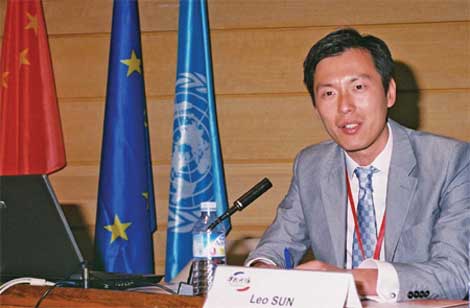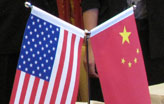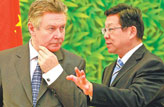Companies
Huawei is 'able and willing'
Updated: 2011-07-22 11:09
By Matthew Morgan (China Daily European Weekly)
 |
|
Leo Sun, chief executive of Huawei France, says the parent company is currently focused on the European markets. Provided to China Daily |
Telecom firm fine-tunes strategy to stay ahead of rivals
For a company that is the epitome of China's manufacturing strength, Huawei has always managed to keep a low profile. But the second largest telecom solution provider in the world is now giving the final touches to a strategy that it hopes will further consolidate and strengthen its presence in the highly innovative and demanding European market.
Huawei last year had a global turnover of $28 billion (20 billion euros) in the telecom industry, just behind its European rival Ericsson which had a comparative figure of $30 billion.
The company offers goods and services ranging from infrastructure to consumer handsets and has more than 5,500 employees spread across several European countries.
While its European headquarters is in Dusseldorf, Germany, it also has a presence in countries such as France, Belgium, the Netherlands, Poland, Romania, Spain and the United Kingdom.
Leo Sun, chief executive of Huawei France and the man who is spearheading the European thrust, says Huawei will rely largely on its cutting edge research and development (R&D) to help achieve its goals.
"We have more than 18,000 patents and almost 50 percent of our employees are dedicated for R&D," Sun says. "Thanks to that innovation, we can maintain our global leading edge in innovative technology."
Sun says that most of Huawei's efforts would be centered on tackling competition from rivals like Ericsson in the telecom space, and others like Nokia, Siemens and Lucent in the network infrastructure market.
But the company will take advantage of the opportunities in Europe to strengthen its presence in the corporate and consumer sectors.
"We believe that our strong R&D capabilities will help in the diversification process and boost growth," Sun says.
Though for most of the last two years Sun was the country manager for Huawei subsidiaries, his new assignment in Brussels as chief executive of Huawei France will focus largely on building partnerships with European institutions and industries.
"Till now we were focused largely on finding solutions that help build value for customers. But as a Chinese company that is investing in Europe, and having grown in scale, it is essential for us to now integrate fully into the industrial environment for sustained long-term growth. For this it is also imperative for us to fully understand the European market, the regulatory environment and other social issues," Sun says.
"We also need to develop common interests between the company and the society so that both can gain from the development. This is the key focus for us in Europe," he says.
Manpower is another area that the company will rely on to drive growth in Europe. Most of Huawei's employees in Europe are Europeans. Last year, Huawei France became the first Huawei subsidiary to be led by a European when Frenchman Francoise Quentin became its chairman.
"He has taken a very important strategic management position in Europe to help define our strategy," says Sun.
"We are planning to ramp up hiring in Europe over the next three to five years. But there is also the challenge for us to get these people on board as early as possible since it takes time for them to integrate with our corporate culture," he says.
Sun says that the company will work more closely with the European universities to help more young people understand the company, the sector and the industry.
Given that Huawei has already quintupled in size over the past six years, there are also questions on how the company views the future. But Sun remains unfazed and says that there is still room for growth in Europe.
"Between Europe and China, in regards telecoms, there is a lot of potential to grow together. Broadband telecommunication is the main thrust of the European telecom policy and there is a goal to have 100 percent digital broadband coverage by 2013."
For Huawei, there are a lot of synergies in the future as communication needs are increasing, he says.
Opportunities are no longer limited to voice but extend to broadband data and multimedia. And communication is not just through personal computers, but also through smart phones, tablets and cloud-computing.
"Strategically, these are all important areas that we would like to get involved in the future in Europe."
Sun says that in most of the new domains, the market is still not fully globalized. In the telecom sector, only the solutions provider domain is a globalized market.
"Because of globalization, competition is fierce and requires companies to be extremely innovative and customer and client-oriented. At Huawei, we will strive to maintain our lead in the technology sector," he says.
Sun is candid when asked whether Europe was a tough market for foreign firms.
"I cannot say Europe is especially difficult (for doing business in), but the European market is highly innovative and extremely demanding. So we will look to hone our strengths in marketing and R&D investment," he says.
"If we develop some products or features that we can adopt in the European markets, then we basically have a winner for other markets too. Hence, Europe will continue to be an important area for us," Sun says.
Despite the rapid strides, there have been some stumbling blocks for Huawei, such as the issues arising from lack of proper communication. Such issues led to Huawei losing out on major deals and contracts in the US and some other nations.
But Sun says the lingering doubts are something that the company is keen to address.
"When a company grows bigger and bigger it is natural that you face certain criticism, or paranoia or curiosity from the public. People will certainly want to know who or what is the company and who the founder is and how it grew at such rapid pace in so short a time.
"It is a reasonable situation and will take time to resolve and needs initiative from both sides to resolve the misunderstandings. I sometimes wish that we could find smart and efficient ways to shorten the periods of misunderstanding so that we can create more opportunities. I also feel that it is our duty to take the initiative in this regard as it is we who are steering the company's business in these domains."
Sun agrees that Chinese companies need to do a lot more to tackle issues like distrust and misunderstanding.
"Absolutely, I think it takes time. When we started developing our business, we didn't spend too much time on issues like communication. Initially our goal was simply to ensure that our customers know that we are a good company and that we can bring more value to them."
He admits that such issues are more of a fundamental thing and would ultimately be resolved in the long run.
"When you (companies) grow, you feel that if you don't deal with it you may get some negative impact. There is also the need to contribute to society. A lot of Chinese companies are still in early stages of development in the international marketplace and they need to solve survival issues and formulate business strategies to succeed. So I think it will take some time before Chinese companies start adapting to these issues."
Sun says that he remains confident about Chinese companies taking more steps in future to communicate more transparently and more actively.
"It is important for us to let others understand that we are also doing business and that we bring value to each other," he says.
For Huawei, however, the challenge to transform its image is still a big one. The literal translation of Huawei is "China is able" and given the extraordinary success till now, it is only a matter of time before it scales even greater heights.
Ranked fifth in the world currently in terms of innovation after Facebook, Amazon, Apple and Google, Huawei certainly looks set for bigger things in Europe.

Specials

China-US Governors Forum
The first China-US Governors Forum is held July 15 in the Salt Lake City, the United States.

My China story
Foreign readers are invited to share your China stories.

Rare earths export quota
China kept its export quota at almost the same level as last year.